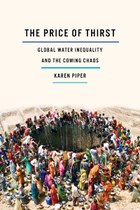People without water are more likely to become extremists: Karen Piper
 Many parts of India battle the dual crises of flooding on one hand and drought on the other. Karen Piper, a professor of postcolonial studies in English and adjunct professor in geography at the University of Missouri, spent seven years investigating the water landscape across six continents for her new book The Price of Thirst. Piper sketches a frightening portrait where thirst is political, drought is a business opportunity, and our most basic natural resource, water, is controlled by multinational corporations. Madhavi Rajadhyaksha talks to Piper about her travels along the Ganga, and the global conflicts over water
Many parts of India battle the dual crises of flooding on one hand and drought on the other. Karen Piper, a professor of postcolonial studies in English and adjunct professor in geography at the University of Missouri, spent seven years investigating the water landscape across six continents for her new book The Price of Thirst. Piper sketches a frightening portrait where thirst is political, drought is a business opportunity, and our most basic natural resource, water, is controlled by multinational corporations. Madhavi Rajadhyaksha talks to Piper about her travels along the Ganga, and the global conflicts over water
It is often said that future world wars will be fought over water. Your book too traces some major global conflicts to water shortages. Are these alarmist predictions?
No, they are not. There are many wars that have already been fought, or are being fought daily, over water. For instance, many Arab-Israeli conflicts have started over water access. The Darfur conflict started over water. What is surprising is that the media usually describes these wars as ethnically or religiously motivated. If we could focus on the actual point of contention - water inequity- the problems could be easier to solve through alleviating water shortages. It is crucial to have impartial international organizations that can help to do this. International organizations like the World Bank often fuel conflicts instead. For example, the World Bank has funded Turkey's Greater Anatolia Project, which is cutting off desperately needed water in Iraq and Syria. ISIS has clearly stated that it will take over Istanbul, if necessary, to keep the water flowing to Syria, because of these cutoffs. It's no wonder that ISIS is trying to take over dams now in Iraq. The fact is that people without water are more likely to become extremists.
Continue reading the interview here.
By: Madhavi Rajadhyaksha
Story Date: 2014-11-09T05:51:00+00:00



